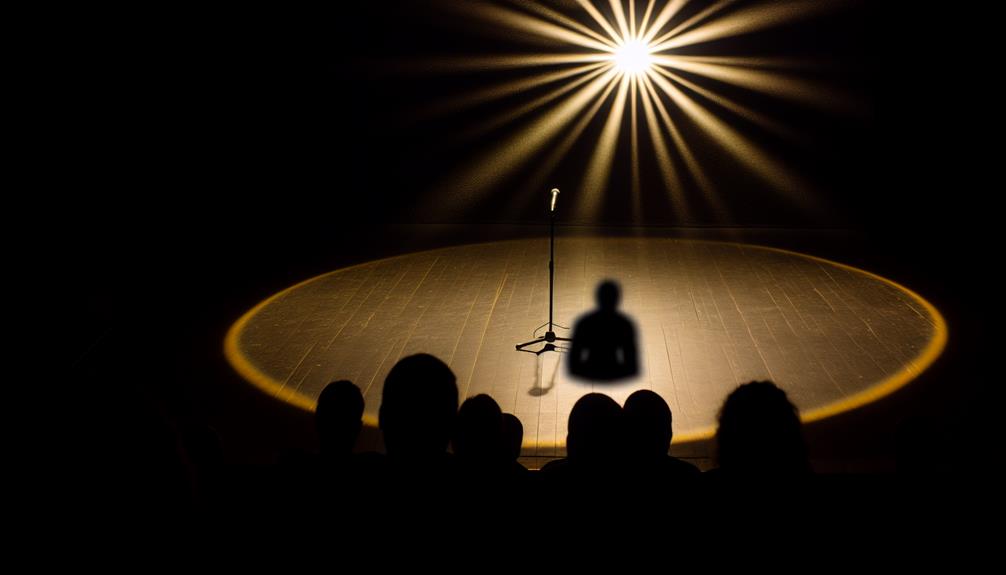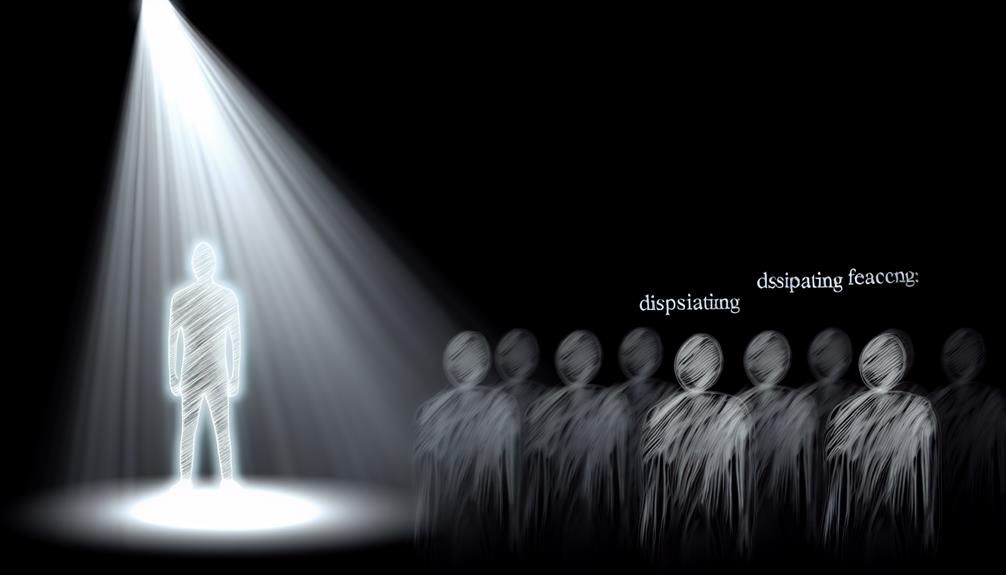Did you know that stage fright affects even the most seasoned performers? It's true! Whether you're an aspiring actor, musician, or public speaker, the fear of performing in front of an audience can be incredibly daunting.
But fear not, for there are proven confidence-building techniques that can help you overcome stage fright and deliver your best performance yet. From simple breathing exercises to developing a pre-performance routine, there are strategies you can implement to release tension, boost your confidence, and manage those butterflies in your stomach.
So, if you're ready to take the stage with poise and self-assurance, let's explore these techniques together.
Understanding Stage Fright

Understanding stage fright can be crucial for performers who want to overcome their fears and excel on stage. Stage fright is a common issue that many performers experience, and it can have a significant impact on their ability to perform at their best. Overcoming stage fright requires confidence building and finding strategies to manage anxiety.
Stage fright is often triggered by fear of failure, judgment, lack of experience, and certain personality traits. It can manifest through physical and emotional effects such as increased heart rate, sweating, trembling, upset stomach, and negative thoughts. Contrary to common myths, stage fright isn't exclusive to amateurs, nor is it a sign of weakness. Even well-prepared performers can experience stage fright.
To overcome stage fright, it's important to address and confront fears. This can involve preparing and practicing extensively, which helps build confidence and reduces performance anxiety. Visualization techniques can also be useful, as they allow performers to mentally rehearse their performance and envision success. Additionally, managing fear and anxiety through relaxation techniques, such as deep breathing and progressive muscle relaxation, can help calm nerves and promote a sense of mental well-being.
Body language also plays a role in managing stage fright. Adopting confident postures and gestures can help boost self-assurance and project a more confident image to the audience. Ultimately, experience is key in overcoming stage fright. The more performers expose themselves to performing in front of an audience, the more they become familiar with the sensations and challenges that come with it, and the better they become at managing their stage fright.
Boosting Confidence Through Self-Talk
Boost your confidence and overcome stage fright through the power of positive self-talk. When you're preparing for a performance, it's common to experience feelings of anxiety and self-doubt. However, by replacing negative thoughts with positive affirmations, you can build your confidence and calm your nerves. Instead of focusing on what could go wrong, remind yourself of your strengths and abilities. Tell yourself that you're capable of delivering a great performance and that you have prepared thoroughly. Visualize yourself on stage, performing flawlessly and receiving applause from the audience. This technique can help boost your self-assurance and reinforce a positive mindset.
In addition to self-talk, engaging in confidence-building activities can also help overcome stage fright. Take on new challenges, such as speaking in front of a small group or joining a performance group. By gradually exposing yourself to situations that trigger stage fright, you can build your confidence and become more comfortable on stage. Consistent practice and establishing routines are also essential in improving your skills and confidence. Set aside dedicated practice time, and incorporate mock performances and rehearsals to simulate the performance environment. By doing so, you can increase your familiarity with the stage and reduce anxiety.
Utilizing Visualization Techniques

Boosting your confidence through self-talk can lay the foundation for utilizing visualization techniques to overcome stage fright and enhance your performance. Visualization is a powerful tool that can help you feel more confident and improve your performance skills when standing in front of a group. Here are some techniques to help you effectively utilize visualization:
- Find a quiet place where you can sit comfortably and visualize successful performances. Imagine yourself confidently delivering your speech or executing your performance flawlessly. This will help build resilience and reduce anxiety.
- Focus on positive affirmations and performance goals during your visualization exercises. Picture yourself receiving applause and positive feedback from the audience. By practicing positive self-talk, you can reinforce your confidence and belief in your abilities.
- Utilize guided meditation sessions specifically designed to boost confidence for performances. These sessions can guide you through visualizations that will help you relax, build confidence, and reduce stage fright.
By visualizing in settings similar to the actual performance, you can effectively prepare yourself for the event. Imagine the venue, the audience, and even the stage setup. This will help familiarize yourself with the environment and make you feel more comfortable when the time comes.
Remember to write down positive affirmations and revisit them during your visualization exercises. This will further reinforce your confidence and help you stay focused on your goals.
Incorporating visualization techniques into your confidence-building routine can greatly aid in overcoming stage fright and help you feel more confident and prepared when performing in front of a group. Keep practicing and don't forget the power of eye contact to engage with your audience and deliver an impactful performance.
Effective Preparation Strategies
Establishing effective preparation strategies is key to overcoming stage fright and delivering a confident and impactful performance. Building confidence starts with regular practice in a safe space. By setting aside dedicated practice time and focusing on specific sections or techniques, you can monitor your progress and stay consistent.
Mock performances and rehearsals are also helpful. Practice in front of an audience, use a timer, recreate the stage setup, and wear performance attire to simulate the actual experience. Mental preparation is crucial. Utilize relaxation techniques like deep breathing to calm your nerves. Developing a pre-performance routine can create a sense of familiarity and confidence.
Additionally, visualization techniques can be effective. Imagine yourself performing flawlessly and receiving constructive feedback. Progressive muscle relaxation is another technique to consider. By tensing and then releasing different muscle groups, you can reduce physical tension and promote relaxation.
On-Stage Strategies for Managing Fear

To effectively manage fear on stage, focus on implementing on-stage strategies that will help you perform with confidence and overcome stage fright. Here are some techniques to help you conquer stage fright and build confidence during your performances:
- Engage in positive visualization: Before stepping on stage, visualize yourself delivering a successful performance. Picture yourself confidently speaking or performing, and imagine the applause and positive feedback you'll receive. This can help replace negative thoughts with positive ones and boost your confidence.
- Practice deep breathing: When you feel nervous or anxious on stage, take deep breaths to calm your nerves. Deep breathing can help slow down your heart rate and relax your body, allowing you to feel more comfortable and focused during your performance.
- Seek support from others: Don't be afraid to reach out to a supportive friend or mentor who can provide encouragement and reassurance. Having someone in your corner can help ease your fears and boost your confidence on stage.
Frequently Asked Questions
What Techniques Are Most Effective for Reducing Stage Fright?
The most effective techniques for reducing stage fright include positive self-talk, visualization, engaging in confidence-building activities, practicing breathing exercises, and seeking support from others. These strategies can help you overcome anxiety and boost your confidence on stage.
How Can I Be More Confident on Stage?
You can be more confident on stage by utilizing positive self-talk, practicing visualization techniques, engaging in confidence-building activities, consistent practice, routine establishment, and incorporating mock performances and rehearsals.
What Is 8 Ways in Overcoming Stage of Fright?
To overcome stage fright, try these 8 techniques: practice regularly, use positive self-talk, visualize success, warm up physically, do breathing exercises, embrace mistakes, seek feedback, and build a support network.
How to Overcome Stage Fear and Gain Confidence in a Presentation?
To overcome stage fear and gain confidence in a presentation, practice positive self-talk, visualize success, simulate performances, use relaxation techniques, and seek support from others. These techniques will help you conquer stage fright and deliver a confident presentation.
Conclusion
In conclusion, overcoming stage fright is possible by incorporating confidence-building techniques such as:
- Breathing exercises
- Warm-ups
- Positive self-talk
- Visualization
- Seeking support
By understanding stage fright, boosting confidence, and utilizing effective preparation and on-stage strategies, performers can conquer their fears and deliver successful performances.
Remember, with practice and perseverance, you can transform stage fright into a source of empowerment and confidence.




